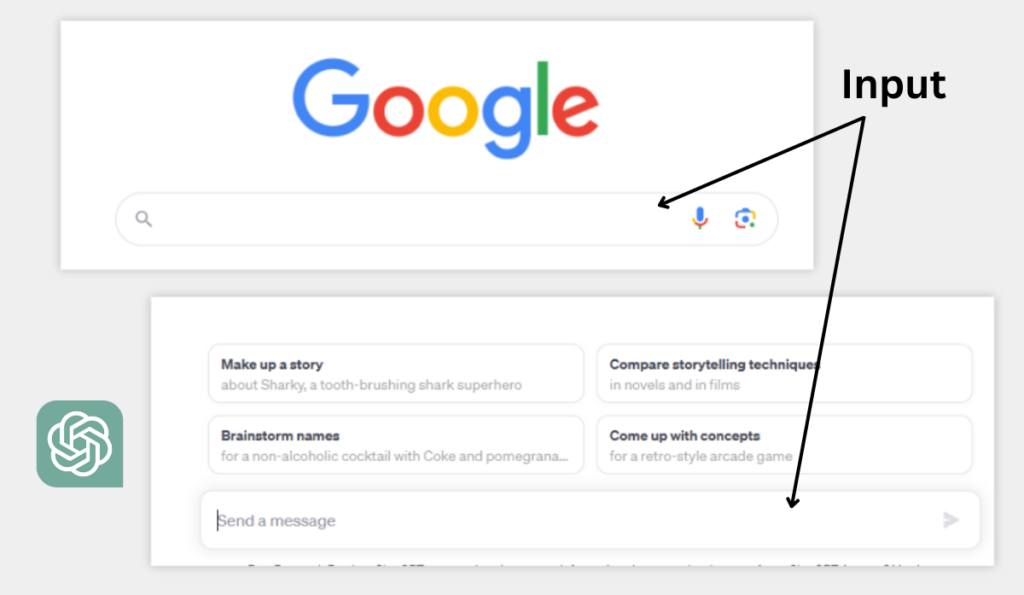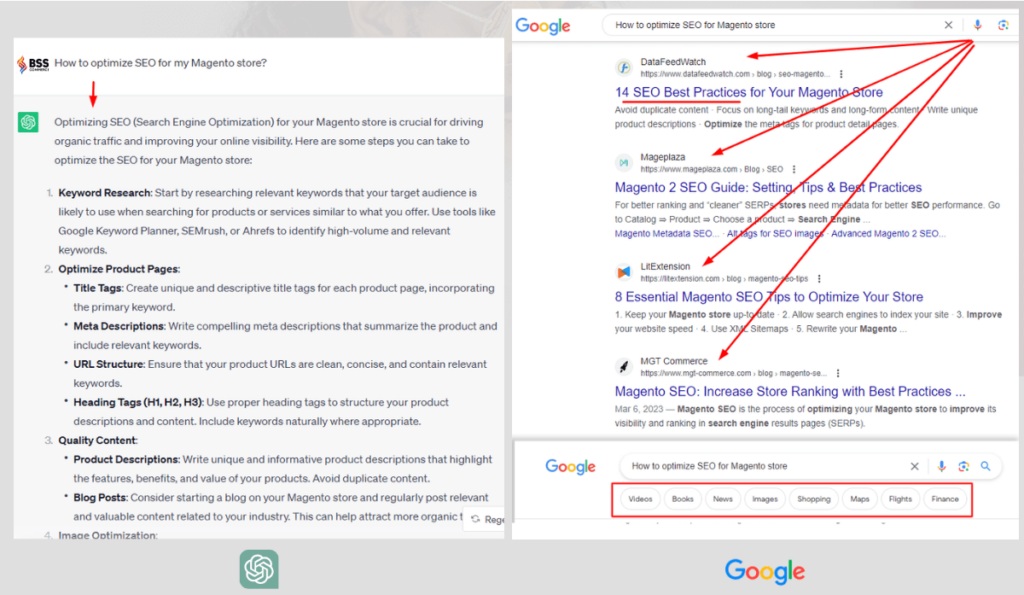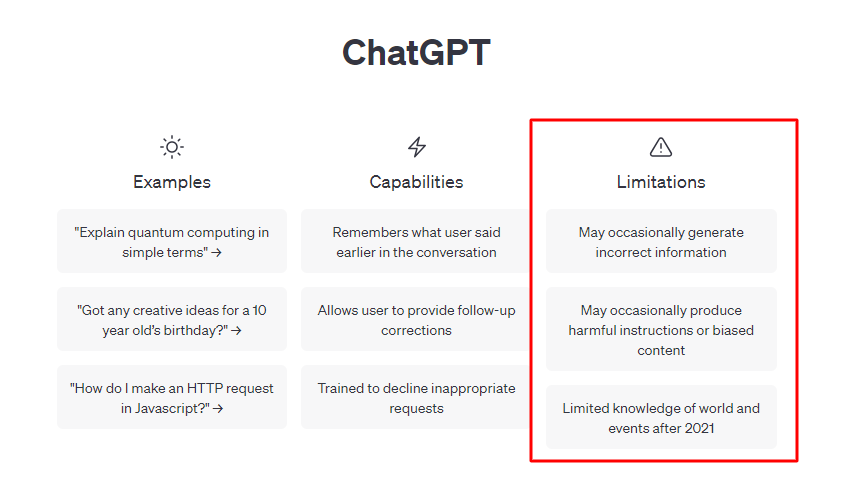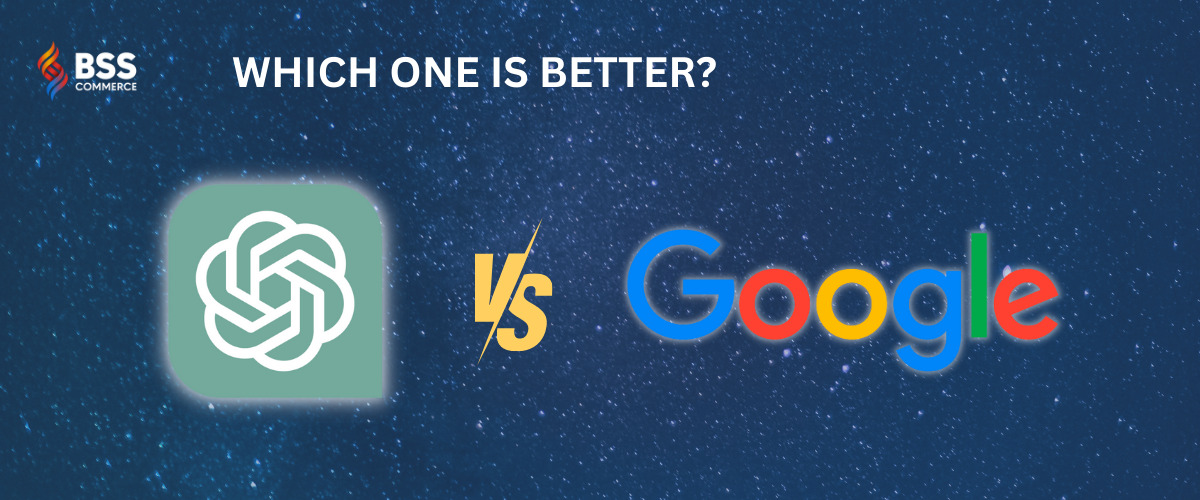The world was taken aback when OpenAI’s ChatGPT was introduced. It has created a wave of adapting AI to everyday work & life, especially in eCommerce. As a result, ChatGPT becomes a highly expected feature to be integrated into Magento stores. This AI machine is somehow conveyed as a very powerful tool for content generation and simple task handling. Users simply need to enter their questions/requirements, and Chat GPT will respond with fully detailed answers. Given that, a lot of people are comparing ChatGPT vs Google.
Some assume ChatGPT can give better search results and information than Google, or even think it will replace this biggest search engine one day.
Let’s find out if this is true. In this blog, we will provide a complete comparison and then finalize the result for this ChatGPT vs Google battle.
ChatGPT & Google Overview
Table of Contents
Understanding ChatGPT & How it works
ChatGPT is an advanced AI language model developed by OpenAI. In simple terms, it’s like an intelligent virtual assistant that can have text-based conversations with people as it has been trained to generate human-like responses to a wide range of prompts. This system uses Machine Learning algorithms, especially Natural Language Processing (NLP). It from a huge amount of text to become a strong language tool.
Moreover, ChatGPT’s abilities go beyond just providing information. It can also help with creative writing, generate ideas, and even offer personalized recommendations based on user’s preferences. Many websites and apps have integrated ChatGPT to enhance their customer support and provide quick assistance to users.
Understanding Google & How it works
Currently, Google is the biggest search engine, operating on a complex algorithm designed to index and rank web content. It constantly crawls the internet, collecting and categorizing web pages to create a massive index.
When users enter search queries, Google’s algorithm evaluates the query’s intent and matches it to the indexed pages, ranking them based on relevance, credibility, and user experience. The search engine’s primary goal is to provide updated, accurate, and helpful information to users quickly.
While both ChatGPT and Google Search involve processing text and delivering information, they serve different purposes and excel in distinct areas. Let’s delve deeper into this comparison.
ChatGPT vs Google: Which one is better?
Similarities
First of all, what do ChatGPT & Google have in common?
Text Processing: Both ChatGPT & Google Search involve processing and understanding text.
Natural Language Understanding: Both systems demonstrate an understanding of natural language to varying degrees.
Information Retrieval: Both platforms aim to provide users with information. ChatGPT offers information in the form of conversational responses or text generation, while Google Search retrieves information from web pages and presents it as search results.

Online Accessibility: Both ChatGPT and Google Search are accessible through online interfaces.
Data-Driven Insights: Both systems benefit from extensive data processing. ChatGPT’s training involves large datasets to understand language patterns, and Google Search relies on indexing vast amounts of web data to provide accurate search results.
Contextual Responses: Both platforms strive to provide contextually relevant information.
AI Advancements: Both ChatGPT and Google Search are products of advanced artificial intelligence research and use Machine Learning algorithms. ChatGPT showcases advancements in natural language processing, while Google Search embodies innovations in search algorithms and web indexing.
Now, let’s see ChatGPT and Google’s differences.
>>> Discover of the best useful function of ChatGPT for Magento 2
ChatGPT vs Google: Functionality
ChatGPT and Google are two different technologies designed for different purposes. The former is designed to generate text and answer questions using natural language, while the latter is designed to search the internet and provide relevant results for a user’s query.
With Google, you make separate & independent queries for any of your intent or anything you need to know. It will crawl billions of websites all over the world, then list them on the result pages that you can access to get your relevant information.
About ChatGPT, it interprets your questions and searches its trained data, then generates the most proper and accurate results for you for that specific query. Or you can keep conversating until ChatGPT understands what you want to get the most satisfied responses.
ChatGPT vs Google: Usability
Here, ChatGPT adopts a conversational method where the AI provides direct responses to your queries, possibly with explanations, but mainly offers clear and direct answers.
In contrast, Google merely retrieves search results. With Google, you’ll need to scroll, select a relevant website, and navigate through its SEO-focused content to find the answer you’re seeking.
Hence, ChatGPT can satisfy you with the most direct answers along with easy-to-understand explanations.
What’s more, the former mostly generates text-based answers, but they can be in the form of paragraphs, tables, even code lines, etc., depending on the user’s prompts. Meanwhile, the latter gives out rather diverse results: websites, ads, images, videos, and news that are related to the search words.

ChatGPT vs Google: Accuracy & Reliability
ChatGPT’s accuracy depends on its training data and the quality of prompts it receives. However, since it relies on learned patterns from data, there’s a chance it might generate responses that sound plausible but aren’t entirely accurate, especially in complex or nuanced queries. OpenAI has stated clearly that ChatGPT has limited knowledge of the world and events after 2021. Therefore, OpenAI has made efforts to reduce the likelihood of misinformation, but there’s still room for improvement.

Google’s accuracy is rooted in its continuous data collection. Google’s accuracy is generally high for well-established facts and widely recognized information. However, it might not filter out misinformation. So the accuracy of search results can vary depending on the query and the sources it pulls from.
In short, Google has an edge in providing accurate factual information due to its sophisticated ranking algorithms and access to a wide array of reputable sources. ChatGPT’s accuracy heavily depends on the quality of its training data and the precision of user prompts.
ChatGPT vs Google: Availability & Accessibility
Google is 100% accessible and free all the time. Meanwhile, ChatGPT can be slowed down when the demand is high. And of course, Google doesn’t require logging in but with ChatGPT you need to pay for an account.
However, it’s better to create an account for both to unlock their possibilities. OpenAI now has supported ChatGPT login with Google, Microsoft, or Apple account.
Concerning accessibility, Google Search is widely accessible through web browsers on various devices, including computers, tablets, and smartphones. It’s a universally available service and does not require specific integration efforts. ChatGPT is available through OpenAI’s API, allowing developers to integrate it into their applications, websites, or services. You can also access it via platforms provided by OpenAI, such as the ChatGPT website.
ChatGPT vs Google: Personalization
Google Search offers personalized search results based on the user’s search history, location, and other preferences. This enables Google to tailor search results, advertisements, and other content based on individual behaviors. But it doesn’t engage in direct conversations. So the personalization it offers is primarily focused on adapting search results to user data.
ChatGPT can excellently simulate personalized interactions by maintaining conversational context and incorporating provided information. It has creative personalization capabilities as it incorporates user-provided details to give the impression of personalized interactions. And by conversational nature, ChatGPT can gradually learn about users to finalize the most personalized answers.
ChatGPT vs Google: Customization and Control
ChatGPT provides more conversational customization and control, allowing users to shape the conversation based on their inputs. You have the ability to refine and direct the conversation by adjusting your prompts.
Google Search, on the other hand, offers limited customization through search operators but mainly relies on its algorithms for delivering search results.
Final verdict for ChatGPT vs Google Search
In summary, ChatGPT shines in generating human-like text, simulating conversations, and creative writing. It’s an excellent choice for applications that requires natural language responses. On the other hand, Google Search is a search engine powerhouse, rapidly fetching factual information from an extensive pool of web data. Its strength lies in providing quick access to reliable and relevant information from across the internet.
So which is the winner? Can ChatGPT replace Google?
For store owners like you, ChatGPT might be better for shopping content generating, personalized messages to customers, and getting SEO-optimized metadata filled up. Regarding competitor and market research, Google can provide you with more information.
>> See more: 10+ Ways To Take Full Advantage Of Magento 2 ChatGPT
All in all, the choice between ChatGPT vs. Google depends on the specific context and the type of accuracy you’re looking for, as well as your specific needs and goals. However, one thing for sure is that Google still excels in certain areas that ChatGPT cannot replace. Therefore, it’s best to utilize both of these brilliant tools for your work.
